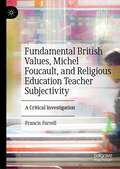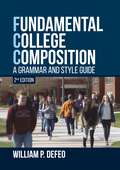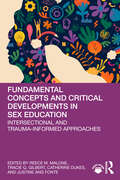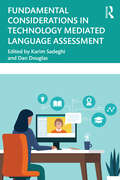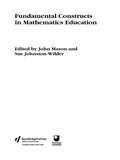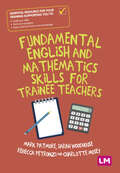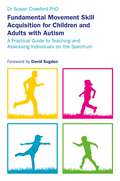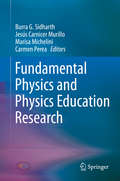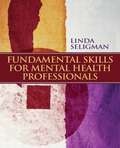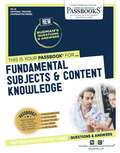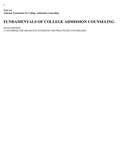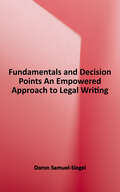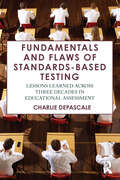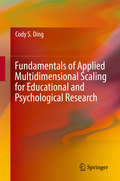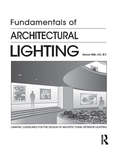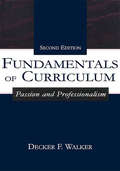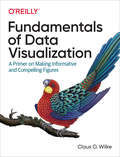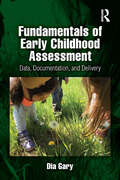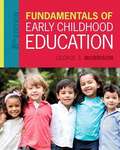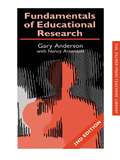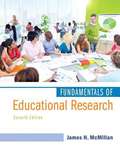- Table View
- List View
Fundamental British Values, Michel Foucault, and Religious Education Teacher Subjectivity: A Critical Investigation
by Francis FarrellThis book contributes to the small but growing critical literature on fundamental British values and the Prevent strategy in the British education system. Focusing specifically on RE, a subject concerned with multiculturalism, difference and pluralism, the book will argue that there is a tension between the aims of RE and the agenda of fundamental British values. The author argues that fundamental British values and the requirements of the Prevent duty (2015) amount to a securitization of education which fundamentally alters the relationship between teachers and learners. The book presents these developments in education policy as a radical discursive shift: drawing from in depth individual and group interviews with 52 secondary teachers of religious education, the book foregrounds the views of BAME teachers and argues for a nuanced and inclusive approach to civic and values education.
Fundamental College Composition: A Grammar and Style Guide
by William Paul DeFeoThis second edition of Fundamental College Composition: A Grammar and Style Guide (FCC: AGSG), contains nine new chapters designed to further assist college students in their journey to become clear and precise writers of English. College classroo
Fundamental Concepts and Critical Developments in Sex Education: Intersectional and Trauma-Informed Approaches
by Tracie Q. Gilbert Reece M. Malone Catherine Dukes Justine Ang FonteThis comprehensive resource equips emerging and experienced sexuality educators with contemporary frameworks for trauma-informed, equitable, and anti-oppressive education.It provides foundational principles for development and delivery, emphasizing inclusivity, accessibility, and intersectionality. Editors Malone, Gilbert, Dukes, and Fonte curate chapters by leading voices on topics such as historical perspectives, values, emotional intelligence, professional humility, reproductive justice, neurodivergence, sex work, kink, childhood and adolescent sexualities, faith-based education, social media, and entrepreneurship. Authors demonstrate decolonization, trauma-informed care, and equity in practice.With practical applications and reflective questions, this book is a vital guide for creating and teaching impactful, inclusive sex education for diverse audiences.
Fundamental Considerations in Technology Mediated Language Assessment
by Karim Sadeghi and Dan DouglasFundamental Considerations in Technology Mediated Language Assessment aims to address issues such as how the forced integration of technology into second language assessment has shaped our understanding of key traditional concepts like validity, reliability, washback, authenticity, ethics, fairness, test security, and more. Although computer assisted language testing has been around for more than two decades in the context of high-stakes proficiency testing, much of language testing worldwide has shifted to 'at home' mode, and relies heavily on the mediation of digital technology, making its widespread application in classroom settings in response to the COVID-19 outbreak as unprecedented. Integration of technology into language assessment has brought with it countless affordances and at the same time challenges, both theoretically and practically. One major theoretical consideration requiring attention is the way technology has contributed to a re-conceptualisation of major assessment concepts/constructs. There is very limited literature available on theoretical underpinnings of technology mediated language assessment. This book aims to fill this gap. This book will appeal to academic specialists, practitioners or professionals in the field of language assessment, advanced and/or graduate students, and a range of scholars or professionals in disciplines like educational technology, applied linguistics and TESOL.
Fundamental Constructs in Mathematics Education
by John Mason Sue Johnston-WilderFundamental Constructs in Mathematics Education is a unique sourcebook crafted from classic texts, research papers and books in mathematics education. Linked together by the editors' narrative, the book provides a fascinating examination of, and insight into, key constructs in mathematics education and how they link together. The choice of constructs is based on (some of) the many constructs which have proved fruitful in research and which have informed choices made by teachers. The book is divided into two parts: learning and teaching. The first part includes views about how people learn - from Plato to Dewey, as well as constructivism, activity theory and French didactiques. The second part includes extracts concerned with initiating, sustaining and bringing to a conclusion learners' work on mathematical tasks. Fundamental Constructs in Mathematics Education provides access to a wide range of constructs in mathematics education and orients the reader towards important original sources.
Fundamental English and Mathematics Skills for Trainee Teachers
by Mark Patmore Sarah Woodhouse Rebecca Petronzi Charlotte MoseyAs a trainee teacher you, must reach a threshold level of skill for English and mathematics. This essential resource for your training supports you to: *audit your skills to find gaps and areas for development; *track your progress as you learn; *keep a record of your skills and competence. The book outlines the ‘basic’ English and mathematics skills needed to teach. It includes key essential knowledge, contextualized for teachers. It includes practice questions for self audit and checklists and progress monitoring support.
Fundamental English and Mathematics Skills for Trainee Teachers
by Mark Patmore Sarah Woodhouse Rebecca Petronzi Charlotte MoseyAs a trainee teacher you, must reach a threshold level of skill for English and mathematics. This essential resource for your training supports you to: *audit your skills to find gaps and areas for development; *track your progress as you learn; *keep a record of your skills and competence. The book outlines the ‘basic’ English and mathematics skills needed to teach. It includes key essential knowledge, contextualized for teachers. It includes practice questions for self audit and checklists and progress monitoring support.
Fundamental Movement Skill Acquisition for Children and Adults with Autism: A Practical Guide to Teaching and Assessing Individuals on the Spectrum
by Susan Crawford David SugdenThis innovative manual sets out advice on fundamental movement skill acquisition (FMS) and its benefits for improving physical, verbal and social skills for people with Autistic Spectrum Disorder (ASD). Improving FMS can help prevent long term health issues, and increase opportunities for social engagement and independence. The book explores the basic skills of movement (running, catching, throwing, and balance) and how to observe, teach and assess FMS in children and adults with ASD. There are sections on how to develop and implement a programme for individuals to guide their personal development, and information on planning and tools for assessment are included. A much needed guide on how to combat impairment of FMS, the book also highlights the numerous benefits of such an approach in relation to behaviour, lifestyle, health and education.
Fundamental Physics and Physics Education Research (Springer Proceedings In Physics Ser. #145)
by Burra G. Sidharth Marisa Michelini Jesús Carnicer Murillo Carmen PereaThis book highlights selected contributions presented at the 15th annual international symposium Frontiers of Fundamental Physics (FFP15), with the aim of informing readers about the most important recent advances in fundamental physics and physics education research. The FFP series offers a platform for physicists from around the world to present their latest theories and findings. The latest symposium was held in Orihuela, Spain and covered diverse fields of research, including gravitation, astronomy and astrophysics, physics of complex systems, high-energy physics, and mathematical physics. Considerable attention was also paid to physics education research, teacher education in physics, and the popularization of physics. In a knowledge-based society, research into fundamental physics plays a vital role in both the advancement of human knowledge and the development of new technologies. Presenting valuable new peer-reviewed contributions submitted from 15 countries, this book will appeal to a broad audience of scholars and researchers.
Fundamental Skills for Mental Health Professionals
by Linda SeligmanThis book is intended to help students and novice clinicians, as well as more experienced clinicians, in the mental health professions of counseling, psychology, and social work to develop competence in the fundamental skills of their profession. With a solid grounding in such skills as effective use of questions, reflection of feelings, eliciting and modifying dysfunctional thoughts, and behavioral change strategies, clinicians can both acquire a sound understanding of their clients and develop strong helping skills.
Fundamental Subjects: Passbooks Study Guide (National Teacher Examination Series (NTE) #Dantes-65)
by National Learning CorporationThe National Teacher/PRAXIS Examinations are designed to provide objective measurement of the knowledge, skills and abilities required of teachers. The Passbook® for the Fundamental Subjects: Content Knowledge exam provides hundreds of multiple-choice questions in the areas that will likely be covered on your upcoming certification test.
Fundamental Uncertainty
by Roberto Scazzieri Silva Marzetti Dall’Aste BrandoliniThis volume addresses the subject of uncertainty from the point of view of an extended conception of rationality. In particular, the contributions explore the premises and implications of plausible reasoning when probabilities are non-measurable or unknown, and when the space of possible events is only partially identified.
Fundamentals Of College Admission Counseling (fifth Edition): A Textbook For Graduate Students And Practicing Counselors
by National Association for College Admission CounselingCompletely updated, the textbook is the definitive classroom resource for graduate education programs in secondary school counseling. It is also a must-read for practicing counselors, particularly those new to the profession. The textbook includes 26 chapters authored by leading practitioners as well as researchers and higher education faculty. The text includes information on counseling foundations and theory, ethics and practice, student pathways and options, serving diverse student populations, and more. This edition also includes the following new Foundations of Standardized Admission Testing Advising Students and Families About Paying for College Counseling First-Generation Students and Families Technology Tools for the Savvy School Counselor Serving Undocumented Students Counseling International Students at US High Schools Advising the Transnational Applicant
Fundamentals Success: A Q & A Review Applying Critical Thinking to Test Taking (3rd Edition)
by Patricia M. Nugent Barbara A. VitaleCompletely revised and updated, the 3rd Edition of this popular resource features more than 1,200 classroom-tested, NCLEX-style questions that reflect the latest advances in medical technology as well as the most recent guidelines and standards of care for nursing practice.
Fundamentals and Decision Points: An Empowered Approach to Legal Writing
by Doron Samuel-SiegelThis concise text frames legal writing as a process built around a set of predictable, principle-driven decision points. It empowers students to navigate those decision points with confidence because, rather than treating memos, briefs, and letters as skillsets unto themselves, it teaches a consistent process applicable to all documents students are likely to face throughout their careers. <P><P>Centering both traditional and critical approaches, as well as intercultural communication skills, the book helps students learn the fundamentals of deductive reasoning and CREAC, while also introducing analytical and rhetorical tools for when existing laws or conventions are likely to produce injustice. Three foundational chapters describe step-by-step processes for conducting legal analysis, legal writing, and legal citation, respectively. The remaining chapters equip students to practice applying the fundamental processes to common settings such as predictive writing for law-trained audiences (memos, letters, and emails); oral presentations; advisory writing for lay clients; and persuasive writing to opposing parties and decision-makers. Finally, the Appendix provides robustly annotated examples including a legal memorandum, an executive summary email, a letter to a lay client, and a trial court brief.
Fundamentals and Flaws of Standards-Based Testing: Lessons Learned Across Three Decades in Educational Assessment
by Charlie DePascaleWhen put to the test, will standards-based reporting remain as “fundamentally flawed” as once feared, or can next-generation approaches refine the system for the better? Fundamentals and Flaws of Standards-Based Testing offers an inside perspective on the technical challenges encountered during each phase of the assessment cycle. Careers in state testing are spent balancing technical, logistical, financial, political, psychological, sociocultural, emotional, and measurement considerations while keeping an eye on the educational goals of the state assessment program. This insightful and comprehensive book draws on measurement foundations and real-life experiences in state testing to discuss critical and still unresolved technical and policy challenges that are being inherited by today’s assessment specialists and psychometricians.Going beyond core descriptions of psychometric and assessment development procedures and operational best practices in testing, this book exposes graduate students and scholars of educational measurement and policy as well as testing industry professionals to real-life pressures faced by those charged with designing, implementing, and maintaining a large-scale state assessment program. Standard-setting, test design, score reporting, validation, and more are approached critically and with authentic context.
Fundamentals in Assistive Technology 4th Edition
by Michelle L. LangeAn Introduction to Assistive Technology Implementation in the Lives of People with Disabilities
Fundamentals of Applied Multidimensional Scaling for Educational and Psychological Research
by Cody S. DingThis book explores the fundamentals of multidimensional scaling (MDS) and how this analytic method can be used in applied setting for educational and psychological research. The book tries to make MDS more accessible to a wider audience in terms of the language and examples that are more relevant to educational and psychological research and less technical so that the readers are not overwhelmed by equations. The goal is for readers to learn the methods described in this book and immediately start using MDS via available software programs. The book also examines new applications that have previously not been discussed in MDS literature. It should be an ideal book for graduate students and researchers to better understand MDS. Fundamentals of Applied Multidimensional Scaling for Educational and Psychological Research is divided into three parts. Part I covers the basic and fundamental features of MDS models pertaining to applied research applications. Chapters in this section cover the essential features of data that are typically associated with MDS analysis such as preference ration or binary choice data, and also looking at metric and non-metric MDS models to build a foundation for later discussion and applications in later chapters. Part II examines specific MDS models and its applications for education and psychology. This includes spatial analysis methods that can be used in MDS to test clustering effect of items and individual differences MDS model (INDSCAL). Finally, Part III focuses on new applications of MDS analysis in these research fields. These new applications consist of profile analysis, longitudinal analysis, mean-level change, and pattern change. The book concludes with a historical review of MDS development as an analytical method and a look to future directions.
Fundamentals of Architectural Lighting
by Samuel MillsThe theme of this book is that light is an inseparable part of architectural design, and is intended to provide students of architecture and interior design with a graphic guideline to the fundamental role lighting plays in this process. While simple light sources may be enough to satisfy practical needs, the design process must expand beyond basic illumination. The challenge for architects and designers is the creation of luminous environments offering visual interest and a sense of well-being, while also meeting basic seeing needs. Technological advances provide opportunities for the lighting designer's creative introduction of light, and the visual and psychological perceptions of the illuminated architectural environment. Fundamentals of Architectural Lighting offers a complete comprehensive guide to the basics of lighting design, equipping students and practitioners with the tools and ideas they need to master a variety of lighting techniques. The book is extensively illustrated with over 250 illustrations to demonstrate basic principles and procedures. It is an excellent resource for anyone interested in the fundamentals of integrated lighting for architectural interior spaces.
Fundamentals of Curriculum: Passion and Professionalism
by Decker F. WalkerGraduate students and teachers of introductory graduate courses in curriculum have many textbooks to choose from. What is special about Fundamentals of Curriculum: Passion and Professionalism, Second Edition? Content and approach: Clear, focused, and tightly structured, this text provides essential information and resources education professionals need to effectively deal with the urgent and important curriculum problems they face in schools today. Part I ("Perspectives") looks at curriculum from five fundamental perspectives: curriculum work, traditions of curriculum practice, curriculum theories, curriculum reforms, and curriculum studies. Part II ("Practice") applies these perspectives to important curriculum challenges that arise when people try to improve curriculums in schools and classrooms. Chapter features: Each chapter opens with a thought-provoking quotation and a set of guiding questions, and ends with "Questions and Projects" and "Further Studies" essays that recommend readings, Web resources, and other ways to study more about the topic. Distinctive qualities: Comprehensive. Readers are acquainted with the major schools of thought, value systems, lines of activity, and forms of inquiry in the field. Rigorous. The most rigorous research and scholarship on curriculum questions is cited and described; research and scholarship are used to ground discussions of curriculum questions; readers are introduced to the considerations involved in doing rigorous studies of curriculum questions. Practical. First, the focus is on curriculum practice. Theory, research, and other important facets of curriculum studies are presented as vitally important to practice, but the primary subject is what teachers and others do that students experience. Second, the text is practical in a more philosophical sense, taking the fundamental questions of curriculum studies to be practical questions and the primary task of curriculum inquiry to be informing decisions about what to do. Professional. Curriculum matters are approached professionally both in the sense that the text is designed to prepare readers for professional roles doing curriculum work, and also in the moral and ethical sense that attention is paid throughout the book to the responsibility of curriculum professionals in the public schools to serve the public interest. New in the Second Edition: The essential message and basic structure of the first edition is preserved, but the text has been significantly reworked to be: *leaner and simpler--the number of chapters is reduced from 13 to nine and the number of pages reduced almost as much; *more tightly focused on the ideas, arguments, and examples that are essential learning for anyone entering the study of curriculum--chapters less central to the primary concerns of curriculum professionals and scholars have been cut; *throughly updated and strengthened as an introduction to research and scholarship in curriculum studies--many new excellent studies have been integrated, and examples, references, and recommended readings included; and *more direct--the practical, professional message that is the book's main message is more clearly articulated.
Fundamentals of Data Visualization: A Primer on Making Informative and Compelling Figures
by Claus O. WilkeEffective visualization is the best way to communicate information from the increasingly large and complex datasets in the natural and social sciences. But with the increasing power of visualization software today, scientists, engineers, and business analysts often have to navigate a bewildering array of visualization choices and options.This practical book takes you through many commonly encountered visualization problems, and it provides guidelines on how to turn large datasets into clear and compelling figures. What visualization type is best for the story you want to tell? How do you make informative figures that are visually pleasing? Author Claus O. Wilke teaches you the elements most critical to successful data visualization.Explore the basic concepts of color as a tool to highlight, distinguish, or represent a valueUnderstand the importance of redundant coding to ensure you provide key information in multiple waysUse the book’s visualizations directory, a graphical guide to commonly used types of data visualizationsGet extensive examples of good and bad figuresLearn how to use figures in a document or report and how employ them effectively to tell a compelling story
Fundamentals of Early Childhood Assessment: Data, Documentation, and Delivery
by Dia GaryThis comprehensive, research-based textbook equips teachers with the tools they need to comprehend and document the learning progression and academic growth of young learners.An ideal text to enhance teacher preparatory standards for trainees, the book explains the teacher’s role in assessment; outlines the differences between and purposes for informal and formal assessment strategies; and demonstrates how to select appropriate assessment tools aligned with the intended purpose. Designed to serve as a core text for early childhood assessment courses, with suggested instructor and class activities included at the end of each chapter, the book presents relevant research and anecdotal accounts of how effective teachers can ethically administer assessments to young children and plan learning progressions for students that enhance and promote continued learning. Moreover, the text suggests strategies to communicate the score results to colleagues, parents, and students.Reflective of current content standards including the Common Core State Standards, Fundamentals of Early Childhood Assessment: Data, Documentation, and Delivery is essential reading for new and preservice teachers learning to design and conduct effective, reliable, ethical, and valid assessments for young learners.
Fundamentals of Early Childhood Education (8th Edition)
by George S. Morrison<p>This brief, reader-friendly look at the field of early childhood education has become a best-selling classic, appreciated for its practical, applied approach and its engaging chapter features that look at every aspect of the field of early childhood education–early childhood programs, professionals in practice, diversity strategies, technology issues, and ethical decision making. <p>Young children’s unique developmental and education needs are covered from birth through age eight in separate chapters on infants and toddlers, preschoolers, kindergartners, and the primary grades. The book’s emphasis on professionalism throughout keeps the focus on meeting the needs of each and every child and providing up-to-date information and strategies to develop competent, informed early childhood professionals. <p>Thoroughly revised and updated throughout, this edition offers a contemporary, accessible, user-friendly approach to all of the major topics, programs, and issues at the forefront of the field today.</p>
Fundamentals of Educational Research
by Garry Anderson Nancy ArsenaultFundamentals of Educational Research succeeds in cutting through the complexities of research to give the novice reader a sound basis to define, develop, and conduct study, while providing insights for even the accomplished reader.This best-selling book is of value to all social researchers, but in particular to upper-level undergraduate and graduate students as well as researchers employed in private industry, management and government agencies. Anderson discusses the research process and offers a wealth of information on how to define a research problem, plan a study, develop a research framework, collect the data, analyse it and write it into a credible paper or thesis. He has captured the essential components of the research process in a book that balances the quantitative and qualitative perspectives through both the academic and consulting research traditions.
Fundamentals of Educational Research, Seventh Edition
by James H. McmillanAccessible, contemporary, and thoughtful, Fundamentals of Educational Research helps readers become intelligent consumers of educational research and introduces basic research principles to those who may eventually use research in their work. Principles for conducting research and criteria for evaluating its overall credibility are presented in a concise manner, with numerous excerpts from published studies to enable readers to learn to read, understand, and evaluate research and to judge the usefulness of the findings for educational practice. The text facilitates learning with the inclusion of chapter objectives, roadmaps and concept maps, study questions, consumer tips, more than 175 examples from published articles, several full length articles, and author reflections. The Enhanced Pearson eText features embedded video and assessments.
